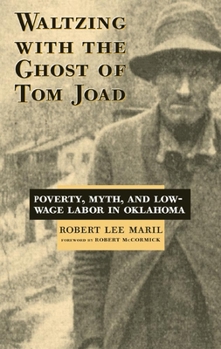Waltzing with the Ghost of Tom Joad: Poverty, Myth, and Low-Wage Labor in Oklahoma
Select Format
Select Condition 
Book Overview
In Oklahoma, eighth-poorest state in the nation, poverty is a pressing social problem. Even so, Robert Lee Maril's Waltzing with the Ghost of Tom Joad is the first comprehensive analysis of poverty in the state. Skillfully combining ethnography with statistical analysis, Maril portrays the lives of poverty-stricken Oklahomans, many of them children, minorities, and the elderly. Exploring myths about the poor and discussing the facts...
Format:Paperback
Language:English
ISBN:0806134283
ISBN13:9780806134284
Release Date:September 2002
Publisher:University of Oklahoma Press
Length:168 Pages
Weight:0.65 lbs.
Dimensions:0.6" x 6.1" x 8.2"
Customer Reviews
2 ratings
i'm in this book
Published by Thriftbooks.com User , 23 years ago
i'm one of the cases in this book and was quite pleased with how it turned out. hopefully this will open up people's eyes to the fact that the state we live in has no concern for its poor. luckily i was able to rise above the circumstances and become "lower class" instead of "poverty stricken".
Still poor after all these years
Published by Thriftbooks.com User , 23 years ago
Question: What do most service sector jobs, hog farms, chicken plants, and so-called right-to-work laws have in common? Answer: All do, or will, contribute to the perpetuation of poverty in Oklahoma, already the eighth-poorest state in the nation. This book should be a best seller in Oklahoma. It won't be, but it should. Amazingly, as we enter the 21st century, this is the first comprehensive study and analysis of poverty in a state that has consistently experienced a poverty rate above the national average. Using ethnography with statistical analysis, Maril has explored the age-old myths about the poor, discusses the facts behind the myths, and points to the real causes of poverty, expecially low-wage labor, which has been the hallmark of most state so-called "economic development" programs. Maril debunks such myths as the poor being lazy, refusing to work, and on welfare. Among the 600,000 or so Oklahoman's that are poor, some 20% of the population, 52% work and the majority do not, repeat, do not receive welfare assistance. Maril followed twelve poor Oklahoma families over a four-year period and found obstacles such as poor health and a lack of medical insurance, the lack of quality childcare, concerns for personal safety, and low-paying jobs as major contributors to poverty. The author had four major objestives when writing the book. First, to describe the poor and poverty in Oklahoma in detail using historical trends and patterns. Second, to examine the myths, typically accepted as facts, about the poor in Oklahoma. Third, to define the real causes of poverty. Fourth, to propose a public policy agenda that would correct the costly and ineffective system now in effect in Oklahoma. He met, and exceeded, them all. This is an excellent, timely, thoughtful, highly-readable study of the real causes, and costs, of poverty in Oklahoma. While the author may not have all the answers, and public thought and debate on his conclusions and recommendations will be healthy, one thing is for sure: the continued harping on the economic virtues of more hog farms, chicken plants, so-called right-to-work laws, and other low-wage proposals will not help remove Oklahoma from the Tom Joad era. This book is a perfect example of the real need and importance of university presses. OU press is to be commended for their foresight and courage in making it available to the general public. It will not be a best seller...but it should.






